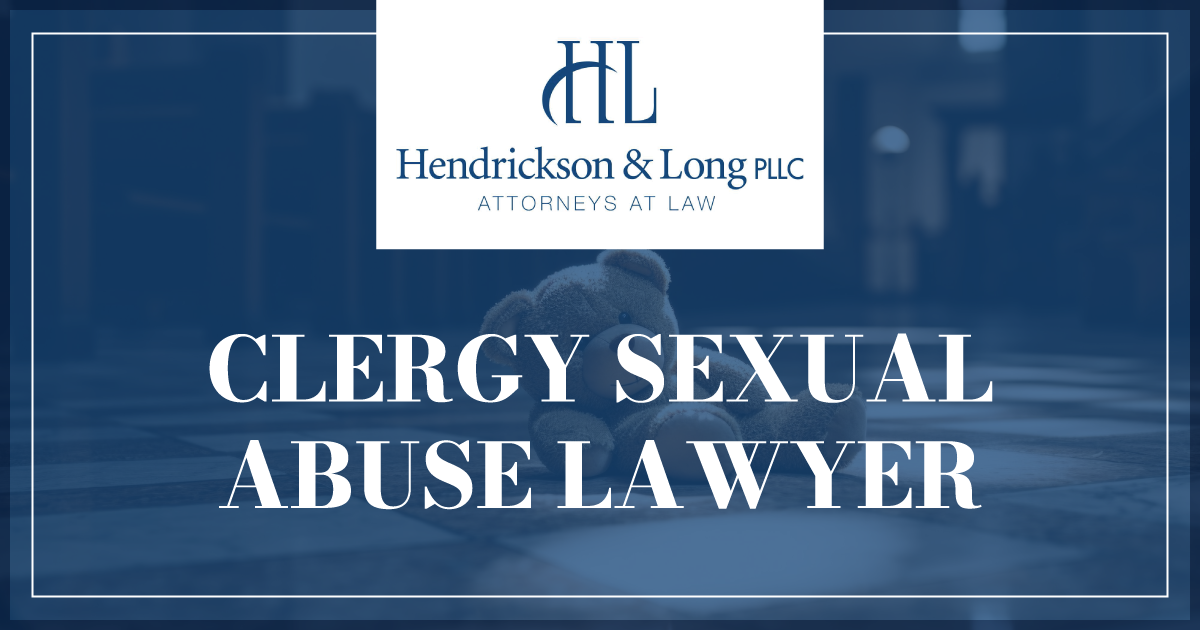Clergy Sexual Abuse in West Virginia
If you’ve watched the news over the past few years, then you’ve likely witnessed a lot of courageous child and adult victims step forward to report cases of clergy sex abuse in West Virginia and elsewhere in our country.
While the #MeToo era likely contributed to this uptick in victims stepping forward; others had decided to step out of the shadows and no longer allow themselves to be victimized long before. It’s your time to feel empowered and regain control over your life’s narrative after a member of a religious institution tried to steal your ability to do so away by abusing you.
Your initial consultation and our handling of your case are completely free unless we secure a settlement for you.
What Does the Term “Clergy” Refer To?
West Virginia laws use the term “clergy” to refer to priests, pastors, ministers, reverends, rabbis, imams, and virtually any heads of religious organizations that West Virginia authorizes to marry couples.
However, it’s important to note that not all church, synagogue, or mosque leaders perform marriages and thus need to be registered with the state. For example, a youth pastor, church elder, or deacon might be held in high esteem by parishioners but not have to be registered.
Although we’ve clarified here what clergy refers to, it’s important to note that someone does not have to fit into that legal definition to commit or be held liable for abuse. Instead, anyone affiliated with a religious organization can be.
Types of Clergy Abuse Cases We Handle
Religious leaders are held in high esteem by many. The higher moral character that many perceive them to have often gives way to people giving them access they otherwise might not have given it to under a different set of circumstances, which is why abuse inflicted by clergy has often occurred in the following ways in the accompanying situations:
- One-on-one project work leading to grooming and ultimately inappropriate sexual contact like unwanted touching
- Taking congregants’ confessions or confiding of deepest, darkest secrets and threatening to reveal them unless they comply with sexually explicit requests
- Randomly visiting members in home and clergy taking advantage of being away from the religious institution or home alone to physically sexually assault them
While we’ve only provided a brief listing of some situations involving non-consensual sexual contact between members of a religious order and congregants if you have reason to believe that what you endured crossed the line between what is acceptable or not, reach out to our firm to discuss what happened with an attorney who regularly handles cases involving clergy sexual abuse in West Virginia so we can determine whether you have a claim you can pursue in civil court.
Where Do Faith-Based Leaders Commit Sexual Abuse?
There’s no one place where this abuse occurs. In our decades of experience in handling these cases at Hendrickson & Long, PLLC, we’ve found that this unwanted sexual contact occurs in the following places:
- Religious facilities, such as a chapel, confessional, fellowship hall, youth ministry building, a pastor’s office during a counseling session, Sunday School classrooms, and a choir or prayer room
- Members’ homes
- During retreats at resorts, hotels, campsites
- Assisted living facilities like nursing homes
- During conferences in green rooms, bathrooms, and closets
- Vehicles, while in transit to community outreach or fundraising opportunities, on trips, and even when “trying to help” by bringing someone home
- School facilities
- Hospitals
Sadly, as the saying goes, “When there is a will, there is a way.” There are very few places where this abuse may not occur. We represent victims who’ve suffered clergy sexual abuse no matter where it occurred.
Understanding Liability for Abuse by Religious Officials
Liability refers to holding someone legally responsible for their actions through the civil law system.
Generally, you, as the victim and plaintiff, must be able to show that a member of the clergy owed you a certain standard or duty of care to keep you safe and violated it, causing you harm, to be able to pursue a lawsuit seeking compensation in a sex abuse case.
Of course, pursuing the actual person who committed the unwanted acts is a given.
Some additional situations involving negligence that may serve as legal grounds for you to pursue a legal claim include:
- Violations of mandated reporter obligations: Individuals who qualify as clergy are like teachers, counselors, doctors, and others in the sense that West Virginia classifies them as mandated reporters. As such, they have an obligation to report any suspected child abuse (including of a sexual nature) to our state’s Department of Health and Human Resources within 24 hours of becoming aware of it. Any failure to do so exposes the clergy member to legal liability.
- Being complicit in facilitating abuse: Our state’s laws allow you to not only hold a perpetrator responsible for sexual abuse but also anyone who aided and abetted them in carrying it out, covering it up, etc.
Members of Clergy We’ve Sued for Sexual Abuse
As referenced above, the term “clergy” isn’t an all-encompassing word if you look at how West Virginia law describes it.
While, in our experience of handling clergy sex abuse cases, we’ve filed suit against leaders of these religious organizations, like rabbis, imams, priests and pastors, and others, we also have a lengthy, successful track record of holding the following perpetrators liable for their inappropriate actions:
- Cantor (also known as chazzan or prayer leader within a synagogue)
- Youth leader
- Sunday school teacher
- Mosque CEO (who typically runs the school and social services programs)
- Choir leader
- Religious education director
- Nursery workers
- Sister or nun
- Fathers or religious brothers
- Monks
- Shul heads
- Elders and ministerial servants (at Kingdom Halls)
- Church bus driver
- Facilities manager
Again, you name it, and, unfortunately, we’ve probably handled a case involving a member of a religious organization’s team that has chosen to take advantage of their position of trust in a congregant’s life and abuse them.
If you’ve been harmed, we won’t let anything stop us from advocating for you so that you can receive some semblance of justice and, hopefully, others don’t have to endure the same.
So, let’s talk about your case and your rights to ensure if you can file suit, we do so before the filing deadline runs out in our state.
Filing Deadlines in Sex Abuse Cases in West Virginia
Our state affords victims of childhood sexual abuse up to four years from the time of discovery of their ill-treatment or up until their 36th birthday (whichever is furthest out) to file a lawsuit against the perpetrator and any other complicit individuals. Adult victims get two years from the date of the inappropriate acts to file suit.
Generally, you wouldn’t be able to recover compensation if the established statute of limitations had lapsed, but we urge you to check with an attorney to make sure the timeline has indeed lapsed instead of abandoning any potential case.
An update to the childhood sexual abuse filing deadline in 2020 made it so that even those who had previously filed a claim and had it denied may now have their cases re-opened and re-reviewed.
What To Expect When Consulting with a Lawyer
We realize that discussing matters as personal as inappropriate sexual contact may make you feel uncomfortable and can easily re-trigger post-traumatic stress disorder and other mental health symptoms you may have worked hard to do away with in the past.
While we certainly need to know critical details to know if you have a valid claim, we promise to be strategic in terms of what we ask and sensitive to your feelings so as to not unnecessarily put you through any additional stress and trauma than what you’ve already endured.
In addition to asking about specifics regarding your case, should we deem you to have a valid claim, you can expect us to go over your legal options and applicable statutes of limitations that apply. In addition, we’ll discuss our plan for securing evidence, what degree of communication you can expect from us if we work together, a ballpark value your case might have, and more.
We’re additionally available to answer any questions you might have about our legal training and work in handling cases involving clergy sexual abuse in West Virginia, whether those legal matters have proceeded to trial or been settled outside of court, and settlements we’ve secured on our clients’ behalf in similar cases.
Now is the time to take action and recover damages for the sexual abuse you suffered.
This is the first step in what’s likely to be a lifelong process of taking back control over your future.
Contact our legal team to speak with an advocate who will support you in holding responsible parties accountable for their actions.


